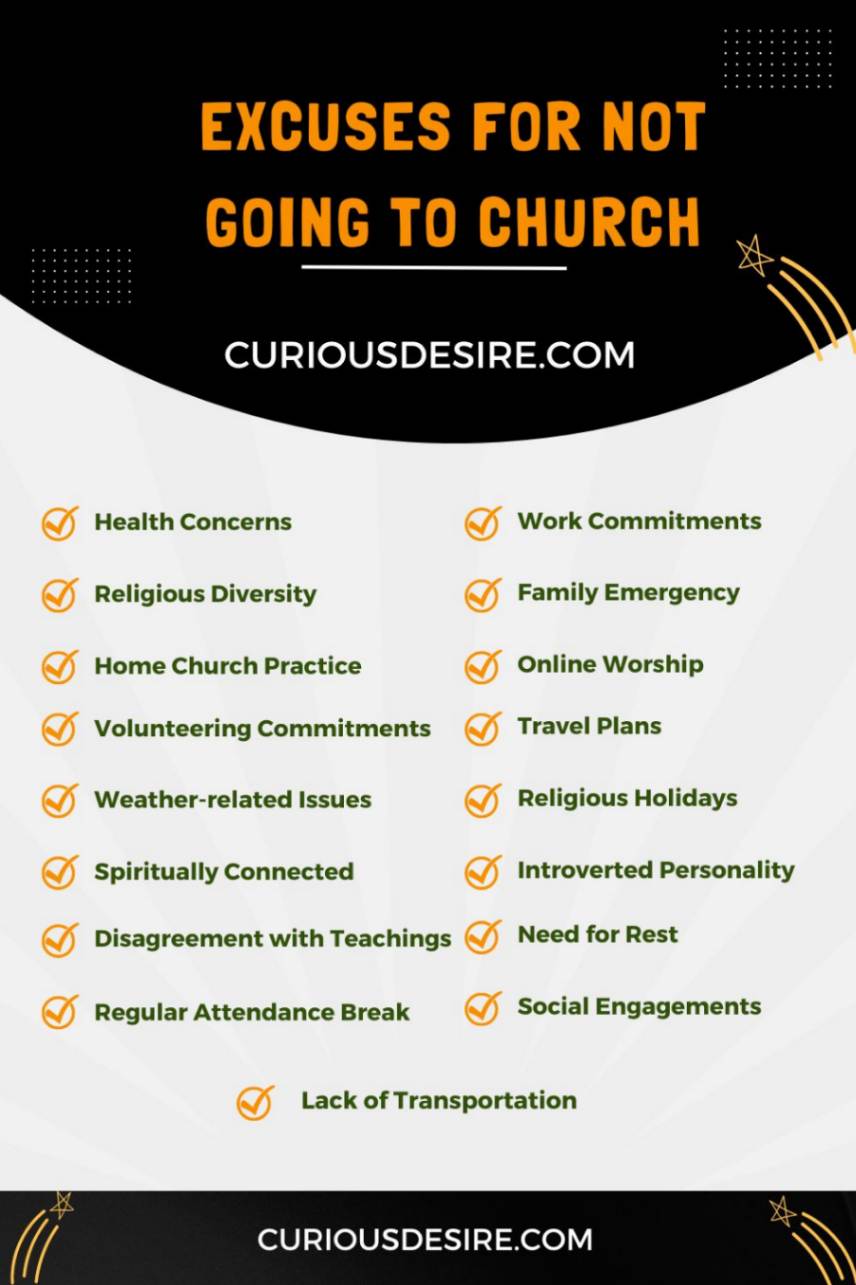Church holds a special place in our lives, right? It’s like that comforting friend we can always rely on. But you know how life goes, throwing unexpected turns our way.
Ever had those days when heading to church is the plan, but life takes a different route? We’ve all been there. In this article, we’re exploring why the church matters to us, and understanding its unique role in our lives.
Yet, we’re also acknowledging those real-life moments that occasionally shift our plans and lead to unexpected changes from the usual church routine. Let’s uncover it together!
Here are the 5 most common excuses for not going to church:
- Health Concerns
- Work Commitments
- Family Emergency
- Travel Plans
- Need for Rest
1. Health Reasons
Taking care of one’s health is important, and sometimes being in crowded places like churches might be risky, especially during flu seasons or in the middle of a pandemic.
Staying home protects personal well-being and prevents potential exposure to illnesses. Ignoring health concerns could lead to the risk of falling ill or spreading contagious diseases to others.
For instance, if someone has a fever or cold symptoms, attending church might not only compromise their health but also risk spreading the illness to fellow churchgoers.
Instead of attending in person, consider participating in online services or connecting with the church community through virtual platforms. This allows for spiritual engagement while protecting personal health and the well-being of others.
2. Work Commitments
Sometimes, work gets in the way of our plans, even the ones we wish we could attend, like going to church. Meetings, deadlines, or unexpected tasks might pop up, making it tough to make it to the service.
It’s like missing a get-together with friends. Work needs attention, but skipping church means missing out on that community feeling and the good vibes for your soul.
It’s a bit like having to choose between getting your work done and feeding your spiritual side. It’s a tough balancing act.
3. Family Emergency
When there’s a family emergency, priorities shift instantly. It could be anything from someone getting sick to a sudden problem that demands immediate attention, taking priority over scheduled church attendance.
4. Travel Plans
Whether for business or fun, traveling can clash with regular church attendance. Being away from home, especially during weekends, might make it impossible to attend your usual church service.
Missing church due to travel plans may lead to a sense of missing out on the community’s activities and spiritual growth opportunities.
For instance, if you have a family trip planned for the weekend, attending your home church might not be possible, and finding an alternative local service might be challenging.
5. Need for Rest
Everyone needs a break sometimes. Life can get hectic, and taking a day off from church might be about needing some rest to recharge your batteries.
Imagine a week full of deadlines and responsibilities. Taking a Sunday to sleep in, chill, or catch up on your favorite shows can be like hitting the reset button.
Constantly pushing without breaks can lead to burnout and exhaustion. Taking a day off for rest helps you better prepare to face upcoming challenges.
6. Online Worship or Meditation
In a digital age, attending church online or practicing meditation can be just as spiritually fulfilling as physically going to a church building.
Picture having a quiet Sunday morning at home, joining an online church service, or spending time in meditation. It’s a modern way of connecting spiritually.
Choosing online worship or meditation doesn’t mean missing out; it’s about adapting to new ways of nurturing your spiritual side.
7. Home Church Practice
Some find comfort in practicing their faith within the coziness of their homes, creating a personal and intimate connection with their spirituality.
For example, setting up a little corner for prayer or reading sacred texts at home can be like having your own sacred space.
It builds a strong personal connection with your faith, but missing out on larger church gatherings might mean less community engagement.
8. Religious Diversity Exploration
Learning about different beliefs helps you see spirituality with a wider perspective. It’s like having more colors to paint your spiritual picture, and it encourages you to be more open-minded and accepting.
For instance, going to events of different faiths is like trying different flavors. You get to understand and respect the unique beliefs and practices of others, making your view of spirituality more welcoming.
While this exploration expands your understanding, it might mean doing something different on a typical Sunday at your church. It’s a choice between the usual routine and the eye-opening diversity of beliefs.
9. Prior Social Engagements
Sometimes, hanging out with friends or family clashes with the usual church time. Making time for these social plans is about balancing both the social and spiritual sides of life.
Think about having a family reunion or celebrating a friend’s birthday on a Sunday – attending these events becomes the top priority.
While it’s important to keep those connections strong, it might mean missing out on the usual church gathering and the spiritual boost that comes with it on that specific day.
10. Weather-related Issues
When the weather gets challenging, like heavy rain or lots of snow, heading to church might not be the safest idea. It’s better to stay home and cozy.
Consider it’s a snowy Sunday, and stepping out could mean slipping on icy roads. Staying home feels smarter.
While missing the in-person church experience, the bright side is you can still catch the spiritual vibes through online services.
It’s like bringing the church vibes right to your living room. It’s like having your spiritual moment while avoiding the challenging weather outside.
11. Feeling spiritually connected elsewhere
When your spiritual vibe leads you elsewhere, it’s about finding that connection beyond the walls of a traditional church.
Maybe it’s a quiet walk in nature, a meditation retreat, or even reading sacred texts at home – wherever it is, it feels like your spiritual sweet spot.
While it might mean missing your regular church routine, the cool part is you get to explore and nurture your spirituality in a way that feels just right for you. It’s like finding your unique path to that inner peace and connection.
12. Volunteer commitments
When you’re dedicated to helping others, volunteering might take the spotlight, even over your regular church plans.
Picture spending a day at a local charity or community event, giving your time and energy to make a positive difference.
It might mean missing your usual church gathering, but the good part? You’re especially contributing to your community. It’s like swapping your usual church routine for a chance to do good, making your spiritual journey hands-on and impactful.
13. Disagreement with Church Teachings
Sometimes, you might feel a bit different from what your church is teaching. It could be because your own beliefs have changed or don’t quite fit with what’s being said.
Think of it like this – your church has a strong opinion on a social issue, like who they think should be in or out. But as time goes by, you start feeling differently.
You start believing in a wider way, where everyone, no matter their differences, is seen as valuable and should be welcomed.
While it might mean you don’t show up at church as much, it’s a chance for you to figure out what you truly believe. In your case, it’s about valuing and embracing everyone, no matter what makes them unique.
14. Decision to Take a Break from Regular Attendance
There are times in life when taking a break from regular church attendance becomes necessary. It could be due to various reasons, such as personal struggles, a need for self-reflection, or adjusting to life changes.
This break allows individuals to step back, think about their spiritual journey, and handle personal challenges. It’s not saying no to faith; it’s just finding a moment to balance things during life’s ups and downs.
For example, imagine someone going through a tough period of grief after losing a loved one. Attending church, while a source of comfort for many, might become emotionally overwhelming during this time.
Taking a break allows them the space to heal, reflect, and find solace in their way, showing that the decision to step back is a form of self-care and personal healing.
15. Lack of Transportation
Sometimes, attending church regularly becomes a challenge due to a simple yet crucial reason – lack of transportation. Not everyone has easy access to cars or reliable public transportation, making the journey to church a bit difficult.
Consider someone living in an area with limited public transportation, and they don’t own a car. Getting to church might involve a long and challenging journey.
In such cases, the decision to miss church isn’t about a lack of commitment but rather the practical difficulty of reaching there without proper transportation.
16. Introverted Personality
For those with introverted personalities, attending large social gatherings like church services might feel overwhelming.
Introverts often need time alone to recharge, and the energy required for social interactions, even in a positive and supportive community like a church, can be exhausting.
Imagine an introverted person who prefers quiet reflection over group activities. While they appreciate the sense of community offered by the church, the large gatherings may not suit their nature.
Choosing personal prayer, reading, or online spiritual resources allows them to maintain their connection with their faith without feeling overwhelmed by social settings.
17. Religious Holidays Observed at Home
Individuals choose to observe religious holidays in the comfort of their homes rather than attending organized church events.
This decision can be influenced by a desire for a more intimate and personal connection with the sacred moments of their faith.
Picture someone spending a religious holiday in their own space, engaging in quiet reflection, prayer, and meaningful traditions. It’s like making the celebration uniquely their own, reflecting what feels spiritually significant on a personal level.
Conclusion
In life, sometimes we may have reasons to miss church, but it’s important to understand the value of being part of a community and growing spiritually together.
While attending church is special, if you can’t make it, prayer is a wonderful alternative. You can connect with your faith in quiet moments or within the comfort of your home.
Remember, it’s not just about going to church but nurturing a personal relationship with your beliefs.
Every reason for missing church is a part of your unique spiritual journey, highlighting the importance of adaptability, compassion, and finding moments of connection—whether among your community or in peaceful solitude.
Excuses For Not Going to Church FAQs
1. Why would someone skip church for personal reflection time?
Individuals may seek solitary moments to deepen their spiritual connection, finding introspection outside the traditional church setting.
2. Is it okay to miss church for health reasons?
Prioritizing well-being is crucial. Taking a break for physical or mental health reaffirms the importance of self-care.
3. How can busy schedules impact church attendance?
A hectic agenda might make it challenging to attend regularly, emphasizing the need to understand life’s demands on faith practices.
4. Why choose personal spiritual growth over regular church attendance?
Focusing on individual spiritual development allows for a more tailored approach, fostering a unique connection with one’s faith.
5. Is exploring religious diversity a valid reason to miss church occasionally?
Yes, attending different spiritual events broadens perspectives, contributing to a richer understanding of diverse faith traditions.
6. Can lack of transportation be a reasonable excuse for not going to church?
Yes, practical challenges like transportation issues can hinder regular attendance, highlighting the importance of accessibility.
7. Is it okay to disagree with church teachings and skip services?
Yes, it’s a personal choice rooted in authenticity. Disagreements can prompt a deeper exploration of one’s beliefs.
8. Why might someone take a break from regular church attendance?
Taking a break allows for introspection and renewal, demonstrating the fluid and dynamic nature of one’s spiritual journey.



